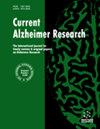肠道微生物失调对阿尔茨海默病(AD)及相关疾病发病机制的影响
IF 1.9
4区 医学
Q3 CLINICAL NEUROLOGY
引用次数: 1
摘要
据推测,肠道微生物群组成的改变,即肠道微生物生态失调,可能与阿尔茨海默病(AD)的发病有关。阿尔茨海默病是痴呆症的最常见原因,其特征是与淀粉样蛋白(a β)斑块的发展相关的认知功能逐渐恶化。肠道菌群失调诱导大量淀粉样蛋白、脂多糖和神经毒素的释放,这些物质可能在调节信号通路和免疫激活中发挥作用,导致促炎细胞因子的产生,与AD的发病机制有关。肠道微生物的生态失调与各种疾病有关,如2型糖尿病、肥胖、高血压和一些神经精神疾病,如抑郁、焦虑和压力。可以想象,这些疾病会引发阿尔茨海默病的发病。因此,通过补充益生菌和益生元来改变肠道菌群组成可以减少抑郁和焦虑症状,降低应激反应性,并改善记忆。本文旨在探讨肠道微生物失调在AD发病机制中的可能作用。本文章由计算机程序翻译,如有差异,请以英文原文为准。
The Effect of Gut Microbe Dysbiosis on the Pathogenesis of Alzheimer's Disease (AD) and related conditions.
It has been hypothesized that the shift in gut microbiota composition, known as gut microbe dysbiosis, may be correlated with the onset of Alzheimer's disease (AD), which is the most common cause of dementia characterized by a gradual deterioration in cognitive function associated with the development of amyloid-beta (Aβ) plaques. The gut microbiota dysbiosis induces the release of significant amounts of amyloids, lipopolysaccharides, and neurotoxins, which might play a role in modulating signaling pathways and immune activation, leading to the production of proinflammatory cytokines related to the pathogenesis of AD. The dysbiosis of gut microbe is associated with various diseases such as type 2 diabetes, obesity, hypertension, and some neuropsychiatric disorders like depression, anxiety, and stress. It is conceivable that these diseases trigger the onset of AD. Thus, modifying the gut microbiota composition with probiotic and prebiotic supplementation can reduce depression and anxiety symptoms, lower stress reactivity, and improve memory. This narrative review aimed to examine the possible role of gut microbe dysbiosis in AD's pathogenesis.
求助全文
通过发布文献求助,成功后即可免费获取论文全文。
去求助
来源期刊

Current Alzheimer research
医学-神经科学
CiteScore
4.00
自引率
4.80%
发文量
64
审稿时长
4-8 weeks
期刊介绍:
Current Alzheimer Research publishes peer-reviewed frontier review, research, drug clinical trial studies and letter articles on all areas of Alzheimer’s disease. This multidisciplinary journal will help in understanding the neurobiology, genetics, pathogenesis, and treatment strategies of Alzheimer’s disease. The journal publishes objective reviews written by experts and leaders actively engaged in research using cellular, molecular, and animal models. The journal also covers original articles on recent research in fast emerging areas of molecular diagnostics, brain imaging, drug development and discovery, and clinical aspects of Alzheimer’s disease. Manuscripts are encouraged that relate to the synergistic mechanism of Alzheimer''s disease with other dementia and neurodegenerative disorders. Book reviews, meeting reports and letters-to-the-editor are also published. The journal is essential reading for researchers, educators and physicians with interest in age-related dementia and Alzheimer’s disease. Current Alzheimer Research provides a comprehensive ''bird''s-eye view'' of the current state of Alzheimer''s research for neuroscientists, clinicians, health science planners, granting, caregivers and families of this devastating disease.
 求助内容:
求助内容: 应助结果提醒方式:
应助结果提醒方式:


